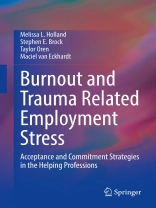Burnout and trauma related employment stress (TRES), which includes compassion fatigue, secondary traumatic stress, and vicarious trauma, are increasing in prevalence as attrition rates, mental health disturbances, and suicide rates are climbing for those in the helping professions. This book highlights the imperative for prevention and early intervention using acceptance and commitment strategies. It includes cognitive, acceptance, and mindfulness techniques to assist the individual in achieving goals through values-based living.
Among the topics discussed:
- Definitions of Burnout and TRES
- Prevalence rates of burnout and TRES in the helping professions
- Mindfulness and acceptance practices
- Defusion and cognitive techniques
- Values based goal setting
- Organizational responsibilities and strategies
- Assessment resources
Burnout and Trauma Related Employment Stress will be a valuable resource for clinicians working with those experiencing the symptoms of TRES and burnout, as well as the individuals themselves.
Table des matières
Chapter 1. Introduction to Burnout and Trauma Related Employment Stress.- Chapter 2. Introduction to Acceptance and Commitment Practices.- Chapter 3. Mindfulness and Acceptance Practices.- Chapter 4. Defusion and Cognitive Techniques.- Chapter 5. Commitment: Values and Professional Goal Setting.- Chapter 6. Organizational Strategies for Addressing Burnout and Trauma Related Employment Stress.- Chapter 7. Assessment, Resources, and Conclusion.
A propos de l’auteur
Melissa L. Holland, Ph D, is a Professor of School Psychology at the California State University, Sacramento (CSUS) and has a private practice specializing in work with children, adolescents, and adults. She is both a licensed clinical psychologist and a certified school psychologist. Dr. Holland has researched and published extensively in the area of mental health on various topics, including emotional and behavioral problems in children, mindfulness interventions, telehealth services, and trauma and homelessness. She also presents workshops at regional and national conferences on the topic of mental health and acts as a consultant in schools and in the medical field, including veterinary settings, focused on burnout and trauma-informed practices.
Stephen E. Brock, Ph D, NCSP, LEP, is a Professor and the School Psychology Program Coordinator at California State University, Sacramento (CSUS). He is a Nationally Certified School Psychologist and Licensed Educational Psychologist, who worked for 18 years as a school psychologist in California before joining the CSUS faculty. Dr. Brock is a past president of the National Association of School Psychologists, and has researched and published extensively in the area of mental health crisis interventions. He also presents workshops at regional, national and international conferences on the topic of mental health and acts as a consultant to schools around the world.
Taylor Oren, Ed S, APCC, is trained in school psychology and clinical psychology. She has worked in a variety of educational and community-based settings including foster care, hospital and substance abuse treatment, homeless rehabilitation, and primary and secondary schools. Her research has included the impact of trauma among homeless youth populations with implications for increased social-emotional learning opportunities. Ms. Oren also presents at local, state, and national conferences on secondary traumatic stress in the school setting and focuses on individual and systems-level prevention and intervention.
Maciel van Eckhardt, Ed S, APCC, is a school psychologist in the East Bay Area in California. She previously worked in a community program for adults and youth with developmental disabilities, applied behavior analysis in-home therapy for youth who have autism spectrum disorder, within primary and secondary schools, and in a homeless rehabilitation program for women and children. Ms. van Eckhardt presents at local, state, and national presentations on the topic of secondary traumatic stress among school staff and related interventions. Her research has included the behavioral and mental health impacts of trauma among youth experiencing homelessness. Ms. van Eckhardt’s research interests include school climate, equitable practices, universal supports, trauma-informed practices, and systems-level interventions.












